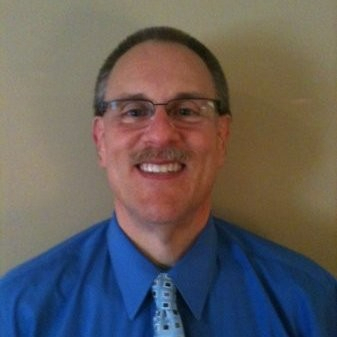At the age 18 while hooked up to monitors in a hospital bed and believing he was going to die of a severe allergic reaction, Bernie Ranchero, MD, MBA, confessed to his pastor he struggled with his sexuality and that he was gay. Growing up in a conservative religious family during the ’80s and’90s while the AIDs epidemic was shaping public perceptions of homosexuality had affected how he saw himself and made him want to hide who he was. It would be many years after his “deathbed confession” for the physician to fully come to terms with his identity and to become accepting of his own self-worth.
“When I was 31 years old, “Dr. Ranchero said, “I reconciled my faith and sexuality, and I came to the realization that I was not an abomination. I had to overcome my own bias I had toward myself.”
 Overcoming his personal struggles and hearing of his patients’ medical experiences in rural Illinois drives him to address the challenges those in the LGBTQIA+ community face. Dr. Ranchero – a Carle Illinois College of Medicine clinical assistant professor, the Coles County Public Health Department medical director and a practicing family medicine physician – presented ‘Killing me softly…. Discrimination and inequality in medicine’ in a recent education series on gender inclusive care.
Overcoming his personal struggles and hearing of his patients’ medical experiences in rural Illinois drives him to address the challenges those in the LGBTQIA+ community face. Dr. Ranchero – a Carle Illinois College of Medicine clinical assistant professor, the Coles County Public Health Department medical director and a practicing family medicine physician – presented ‘Killing me softly…. Discrimination and inequality in medicine’ in a recent education series on gender inclusive care.
Dr. Ranchero discussed how shame and fear of discrimination can be barriers to care among the LGBTQIA+ community, especially for those in areas lacking diversity. Being different can mean being treated differently, even in the healthcare setting.
"I’ve had numerous discussions with patients about this. They don’t even want to call an ambulance because they fear being judged. They're talking to a nurse, to a tech, or provider and they're called by that dead name. When we call them ‘the dead name’ – their old name – that person has to come out all over again,” Dr. Ranchero said. “They have to experience that shame again.”
When treating someone whose experienced discrimination, you can gauge the severity almost as you would with physical burns.
“Have they experienced a superficial burn or is it a fourth degree burn and they don't even know the limb is burnt off because they’re so hurt?” Dr. Ranchero said, “We need to be aware of where that patient is and acknowledge that.”
Dr. Ranchero stressed having a climate of dignity and respect, so patients can be themselves.
“Set the tone for your clinic, for your practice and your colleagues. What kind of environment are you going to have the first time you meet someone you're unsure of their gender or you don't know their sexual identity?”
Reassuring the patient they’re in a safe space is a start. But making a connection with the patient will help establish trust. Dr. Ranchero recommends asking how they wish to be addressed and if they feel comfortable sharing their story.
And rather than assuming a transgender pediatric patient isn’t capable of making important healthcare decisions, Dr. Ranchero said, “We as providers need to ask, ‘Tell me about your journey, about your history.’ From that, we can gather their insight, their judgment and thought processes.”
 RN Program Manager of Carle Faith Community Health, Gregory Scott, MS, RN, recognizes how important it is to connect with patients and try to understand their experience with a mindset of whole-person care – mind/body/spirit.
RN Program Manager of Carle Faith Community Health, Gregory Scott, MS, RN, recognizes how important it is to connect with patients and try to understand their experience with a mindset of whole-person care – mind/body/spirit.
“We get so focused on the clock – ‘I’ve got 15 minutes with you’ – that’s treating the clock and not the person,” Scott said. “Take a moment to listen and honestly hear what they’re dealing with.”
Dr. Ranchero noted that a common challenge for providers is helping to motivate LGBTQIA+ patients seemingly indifferent to their health. In some cases, this stems from the patient’s diminished sense of self-worth.
“They don't see that their life is worth it and that's where we must begin,” Dr. Ranchero said. “We say, ‘No, you're a person and you’re worth the time and effort. I care about you and your health.’”
This was something even Dr. Ranchero needed to hear to combat his own self-loathing and feelings of worthlessness.
“I stand up for them because someone needed to stand up for me and say, ‘Bernie, you're worthy. You're worthy of medicine, you're worthy of good care and you're worthy of love.’ And we as providers need to share that compassion for our LGBTQIA patients.”
Though even providers who want to be compassionate, fair and respectful can be influenced by unconscious biases.
“Our unconscious thought might go against what we know and verbalize. Inside, bias still plays a role,” Dr. Ranchero said. “But we need to meet patients where they are and not ask them to come to our values and culture.”
Scott has noticed how bias can affect patient outcomes and care.
“When patients sense our bias, they may never come back,” Scott said. “We see this escalation of chronic conditions that aren’t managed well, and patients who don’t receive regular annual visits because at some point, they endured a negative experience or trauma.”
Giving patients the care they need and treating them with respect is a duty Dr. Ranchero holds sacred.
“The most defining moments in my life are when I’ve received healing – be it physical, psychological, emotional, cognitive, or spiritual. Those are powerful moments. As healers, we’re called to be conduits, or pathways, for others to receive healing.”
“When I was 31 years old, “Dr. Ranchero said, “I reconciled my faith and sexuality, and I came to the realization that I was not an abomination. I had to overcome my own bias I had toward myself.”
 Overcoming his personal struggles and hearing of his patients’ medical experiences in rural Illinois drives him to address the challenges those in the LGBTQIA+ community face. Dr. Ranchero – a Carle Illinois College of Medicine clinical assistant professor, the Coles County Public Health Department medical director and a practicing family medicine physician – presented ‘Killing me softly…. Discrimination and inequality in medicine’ in a recent education series on gender inclusive care.
Overcoming his personal struggles and hearing of his patients’ medical experiences in rural Illinois drives him to address the challenges those in the LGBTQIA+ community face. Dr. Ranchero – a Carle Illinois College of Medicine clinical assistant professor, the Coles County Public Health Department medical director and a practicing family medicine physician – presented ‘Killing me softly…. Discrimination and inequality in medicine’ in a recent education series on gender inclusive care.Dr. Ranchero discussed how shame and fear of discrimination can be barriers to care among the LGBTQIA+ community, especially for those in areas lacking diversity. Being different can mean being treated differently, even in the healthcare setting.
"I’ve had numerous discussions with patients about this. They don’t even want to call an ambulance because they fear being judged. They're talking to a nurse, to a tech, or provider and they're called by that dead name. When we call them ‘the dead name’ – their old name – that person has to come out all over again,” Dr. Ranchero said. “They have to experience that shame again.”
When treating someone whose experienced discrimination, you can gauge the severity almost as you would with physical burns.
“Have they experienced a superficial burn or is it a fourth degree burn and they don't even know the limb is burnt off because they’re so hurt?” Dr. Ranchero said, “We need to be aware of where that patient is and acknowledge that.”
Dr. Ranchero stressed having a climate of dignity and respect, so patients can be themselves.
“Set the tone for your clinic, for your practice and your colleagues. What kind of environment are you going to have the first time you meet someone you're unsure of their gender or you don't know their sexual identity?”
Reassuring the patient they’re in a safe space is a start. But making a connection with the patient will help establish trust. Dr. Ranchero recommends asking how they wish to be addressed and if they feel comfortable sharing their story.
And rather than assuming a transgender pediatric patient isn’t capable of making important healthcare decisions, Dr. Ranchero said, “We as providers need to ask, ‘Tell me about your journey, about your history.’ From that, we can gather their insight, their judgment and thought processes.”
 RN Program Manager of Carle Faith Community Health, Gregory Scott, MS, RN, recognizes how important it is to connect with patients and try to understand their experience with a mindset of whole-person care – mind/body/spirit.
RN Program Manager of Carle Faith Community Health, Gregory Scott, MS, RN, recognizes how important it is to connect with patients and try to understand their experience with a mindset of whole-person care – mind/body/spirit.“We get so focused on the clock – ‘I’ve got 15 minutes with you’ – that’s treating the clock and not the person,” Scott said. “Take a moment to listen and honestly hear what they’re dealing with.”
Dr. Ranchero noted that a common challenge for providers is helping to motivate LGBTQIA+ patients seemingly indifferent to their health. In some cases, this stems from the patient’s diminished sense of self-worth.
“They don't see that their life is worth it and that's where we must begin,” Dr. Ranchero said. “We say, ‘No, you're a person and you’re worth the time and effort. I care about you and your health.’”
This was something even Dr. Ranchero needed to hear to combat his own self-loathing and feelings of worthlessness.
“I stand up for them because someone needed to stand up for me and say, ‘Bernie, you're worthy. You're worthy of medicine, you're worthy of good care and you're worthy of love.’ And we as providers need to share that compassion for our LGBTQIA patients.”
Though even providers who want to be compassionate, fair and respectful can be influenced by unconscious biases.
“Our unconscious thought might go against what we know and verbalize. Inside, bias still plays a role,” Dr. Ranchero said. “But we need to meet patients where they are and not ask them to come to our values and culture.”
Scott has noticed how bias can affect patient outcomes and care.
“When patients sense our bias, they may never come back,” Scott said. “We see this escalation of chronic conditions that aren’t managed well, and patients who don’t receive regular annual visits because at some point, they endured a negative experience or trauma.”
Giving patients the care they need and treating them with respect is a duty Dr. Ranchero holds sacred.
“The most defining moments in my life are when I’ve received healing – be it physical, psychological, emotional, cognitive, or spiritual. Those are powerful moments. As healers, we’re called to be conduits, or pathways, for others to receive healing.”
Categories: Culture of Quality, Redefining Healthcare, Community
Tags: gender, inclusivity, physicians
